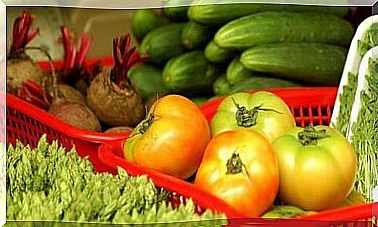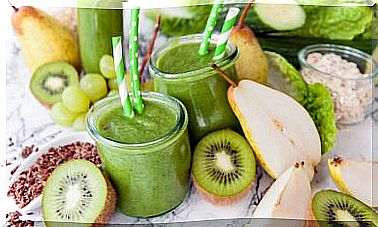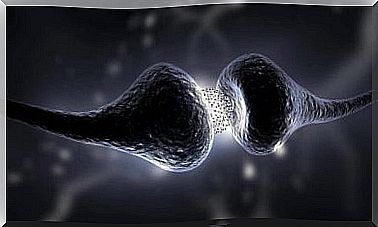Benefits Of Consuming Kiwi In Pregnancy
During pregnancy, the needs of some key nutrients for the development of the fetus and the health of the mother increase considerably. Consuming kiwi in pregnancy can help to cover them satisfactorily.
Both the green and gold varieties provide abundant amounts of vitamins C and K, as well as carotenes, folates, potassium and other components. All of them are optimal at this crucial moment in a woman’s life.
Important nutritional contributions of kiwi during pregnancy
The interest in consuming kiwi in pregnancy is due to its precious nutritional density, important in the diet during these 9 months. We detail the most important compounds that it has below.
Vitamin C
One of the main actions of vitamin C is to help absorb the iron present in food, especially that which comes from legumes, nuts or seeds. In this way, it helps prevent the appearance of anemia in pregnant women, a common problem that can cause fatigue and weakness.
Kiwi is a special source of ascorbic acid, even ahead of some more popular citrus fruits. Including a serving of 150 grams a day of any of these is a good eating habit. They can be added to the salad or mixed with a yogurt along with some nuts or rolled oats.

Vitamins B
The entire complex of B vitamins plays a crucial role, both in the health of the mother and in the development of the fetus during pregnancy. The presence of folic acid or vitamin B9 in kiwi is of special interest.
The body uses this nutrient to form new cells. In early pregnancy, it helps to form the neural tube and prevents some possible malformations in the brain and spine.
Its intake is key for all women of reproductive age, as it is beneficial already in the first weeks of gestation. For this reason, most experts advise supplements and a diet rich in folate-rich foods.
Within these recommendations on the B complex vitamins, cobalamin or B12 is excluded. This is only found in foods of animal origin and kiwi is not a natural source of it.
Vitamin K
This vitamin helps bone development and is necessary for good blood clotting and preventing bleeding.
Vitamin A
With the entry into the second trimester, the needs for vitamin A increase. Its importance in the diet is due to different actions that it develops in the body:
- Strengthens the immune system to respond against infections.
- It favors the maturation of cells.
- Helps the development and formation of the retina.
- Helps in the growth of bones.
Minerals
Not only the vitamins in the fruit are interesting. Consuming kiwi in pregnancy provides a very striking amount of minerals, such as potassium, which helps prevent the appearance of edema and improves fluid retention.
Natural sugars
Like most fruits, kiwi has a sweet taste thanks to the sugar that is present naturally. How can kiwi help in pregnancy in this regard?
Simply because it becomes a very light and healthy option to combat the sweet tooth of cravings and also to sweeten some desserts, such as yogurt or fruit salad, without table sugar.
Low in calories
The energy contribution of kiwi is quite low due to the large presence of water in its composition. However, if the mother’s diet is balanced and she does not have weight problems, there is no need to worry about it at this time.
However, it is helpful when weight gain needs to be controlled. It is also interesting for those women who have a lot of appetite, as it is light and the presence of fiber helps to increase the feeling of satiety.
Fiber intake dietetics
Kiwi is among the fruits with the highest fiber content. Two units provide about 4.5 grams, which represents about 15% of the recommended daily amounts .
One of the problems that appear regularly in pregnancy is constipation and difficulty in evacuating. This usually occurs as a consequence of hormonal change and the pressure of the uterus on the intestine. As pointed out by the Peruvian Journal of Obstetrics and Gynecology, experts recommend increasing the consumption of dietary fiber present in fruits, vegetables, whole grains and nuts.
Kiwi benefits during pregnancy
The importance of consuming kiwi in pregnancy is not only due to its contribution of nutrients, since it has been discovered that it can even improve some common situations and discomforts.
Strengthens the immune system
There is scientific evidence that supports the positive role of vitamin C in immune function. This has been proven both in live studies and in vitro tests .
Leukocytes are a type of cell specialized in protecting the body against external pathogens. These contain high levels of ascorbic acid, signaling one of their key roles in this regard. To all this is added the opinion of the European Food Safety Authority: keeping the body’s defense system in good condition is crucial for its integrity and normal functioning.
Helps digestion
One of the strengths of kiwi in the digestive process is the contribution of proteolytic enzymes. These help to break the protein chains of food and promote its digestion.
This improves some common situations in pregnancy, such as dyspepsia (slow digestion), gas and even gastritis with stomach pain. In addition, the presence of fiber improves intestinal transit problems, facilitating their expulsion and preventing the appearance of hemorrhoids in pregnant women.
Consuming kiwi in pregnancy reduces stress levels
Kiwi contributes to well-being and can help you fall asleep. This action is due to the presence of antioxidants and serotonin. Also thanks to vitamin B9, whose deficit may be among the causes of insomnia.
There is a scientific study that corroborates this activity. It was carried out with 44 adult volunteers with sleep problems who were put on a diet containing 2 pieces of kiwi one hour before going to sleep. After 4 weeks the results showed an improvement in the quality and duration of sleep.

Kiwi Safety and Side Effects During Pregnancy
As a general rule, kiwi consumption is safe during pregnancy, except for those women who have an allergy to any of its components. This may be more common in people who have reactions to pollen or latex. It is necessary to stop eating the fruit if the following signs appear:
- Itching on the palate, mouth or surroundings.
- Hives or inflammation
- Vomiting and stomachaches
In addition, if the usual presence of foods rich in fiber in the diet is low, it is necessary to increase the amount little by little. If it increases very abruptly, it can cause abdominal discomfort and bloating.
Consuming kiwi in pregnancy has benefits for the mother
Adding kiwi to the diet during pregnancy means a good supply of vitamins such as C or K, minerals and fiber, while it helps to improve digestive problems and allows a better quality of sleep. The recommended serving is two medium-sized pieces. It can be eaten as a snack or prepared smoothies, salads, mueslis or yogurts with them.
Ingesting nutrients through food is more advisable than taking supplements, as they are better absorbed and provide many other components that are not found in pills. Only in some specific situations or diseases may it be advisable and necessary to take a multivitamin.









